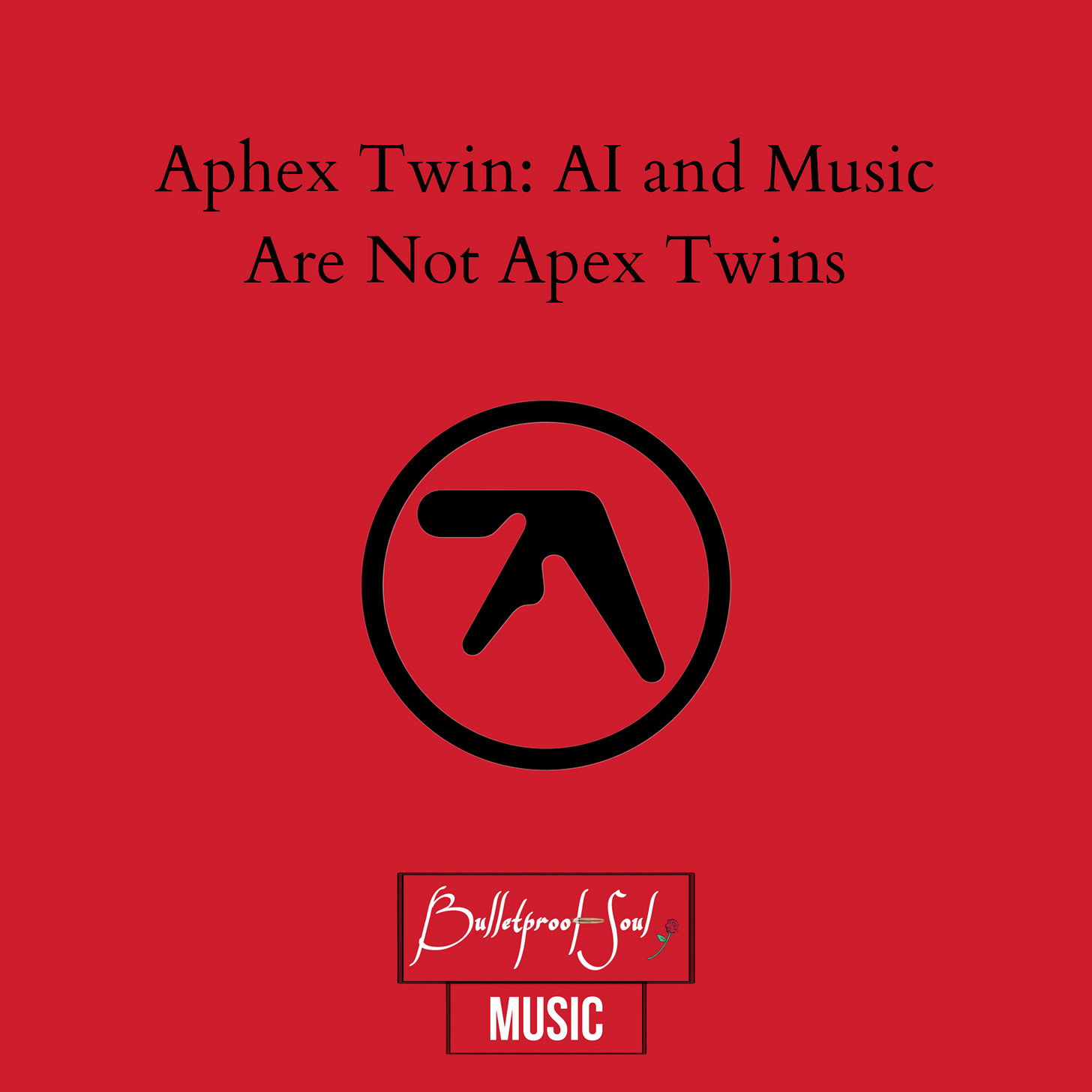Aphex Twin: AI and Music Are Not Apex Twins
Music offers depth that AI can never achieve. Look no further than Aphex Twin.
By Lydia Walker
Yesterday, I sat with a glass of wine, watching the rain through the window. The lights were off, but the cloudy light filtered softly through the white sheers as Aphex Twin’s “#3” played, filling the room with a slow, meditative energy. His music has a way of drawing me inward, helping me drop into my body and fully settle into the moment.
I first discovered Aphex Twin, the British electronic artist renowned for his experimental soundscapes and boundary-pushing music, while lying in corpse pose during a yoga class. The pulse in the room felt both sensual and alien, weighing me deeper into my mat. I’d never felt so magnetized by an instrumental before.
When it comes to music, it’s easy to follow the punchy, digestible tracks designed to hook us within seconds. These songs, curated by algorithms, cater to fleeting attention spans, offering instant gratification. In contrast, Aphex Twin’s music stands as a quiet rebellion. This music basically says, “Take it or leave it.” It feels as if this sentiment has been largely forgotten in the world of AI-curated playlists.
Aphex Twin, aka Richard D. James, is one of the most influential figures in electronic music, known for blending ambient, techno and complex soundscapes in ways that feel completely unique. His discography spans through decades but with a timeless eir. It is shocking to see that “Selected Ambient Works Volume II” was released in 1994 because his sound feels so very modern.
Aphex Twin’s music also embodies transcendence in the way that he doesn’t follow trends. There’s no gimmicky 30 second hooks. There isn’t an obvious formula to his sound. His spectrum of lush and ethereal songs to abrasive jungle soundscapes don’t exactly appeal to the masses. Listening to Aphex Twin reminds me of what music could be when it isn’t tailored for mass appeal or optimized for a quick dopamine hit. I’m intrigued by the nuances of where sound meets click optimization and curated vitality.
In the movie “Vengeance,” Ashton Kutcher’s character, a music producer, asks the journalist what his favorite artists are. Before he can answer, Kutcher says that he bets the journalist is a “playlist guy.” A “playlist guy” meaning someone who likes songs based on what the computer recommends.
He favorites songs based off of those recommendations and then the algorithm recommends similar songs and so on. Kutcher's character suggests that the rise of curated playlists has diminished the importance of the album, of the artist's discography. And I mean, he’s right.
While I haven’t seen this movie in years, I think about this scene often. My first impression was a tinge of embarrassment because I’m totally a playlist girl. I rarely know what to say when someone asks me my favorite artists, albums or songs. At the same time, I still have my go-to artists but I check my “Discover Weekly” religiously on Mondays and have no plans to stop. If you can get a track based off of your mood, I mean, why struggle?
Still, it’s hard to ignore what gets lost in this hyper-curated listening experience. AI playlists offer incredible convenience, but they also narrow our relationship with music into something transactional. Instead of a cohesive body of work that speaks to the artist's muse, creative intention and what makes them unique. The listening experience has morphed into something bite-sized.
If the artist's intention was to create an experience, AI poses the threat of splicing the work into a pretty package for easy listening. Has the convenience of algorithmic playlists made us passive consumers of music, neglecting the rich narratives that albums once offered?
Aphex Twin is an antidote in the world where artists purposely make shorter songs to get more plays on Spotify. Unlike songs fitting into the three to four minute range, designed to hook listeners quickly and encourage repeated streaming, James has stayed true to creating longer and more immersive compositions. Unlike songs that grab you from the hook, James serves a slow burn sound.
His tracks slowly unfold, demanding attention and patience from his listeners. This length isn't a mistake; it’s intentional. By allowing the listener to settle into the sound, experiencing its evolution and waves, it allows the listener to experience a range of emotions, which might not land with a quick hit song.
For me, listening to Aphex Twin is a somatic experience. It reminds me that not everything worth experiencing can be condensed into bite-size pieces, or conform to fleeting demands and ideals. It reminds me that instant gratification doesn’t align with the complexities of music that keeps the listener engaged after the song ends. Sometimes, it’s the slow burn, the longer journey, the intentional pause before a beat drop or beautiful moment that leaves the most lasting impact.
In the end, music transcends the limits of AI, it’s something uniquely human. Music in its true form doesn’t ask for clicks or cater to trends, it just exists. As Aphex Twin himself once said, “Forget all the equipment, forget the music; at the end of the day, it’s just literally frequencies and their effects on your brain."
Stay tuned for upcoming content from Bulletproof Soul. For more from the Bulletproof Soul gang, check out Nyyjerya, Lofty305, DJ Sabrina, Angela Davis, Amouranth, SLWJMZ, TWENTYN9NE, Ali Wisdom, Kengeta, FK Garland, and Austin.




